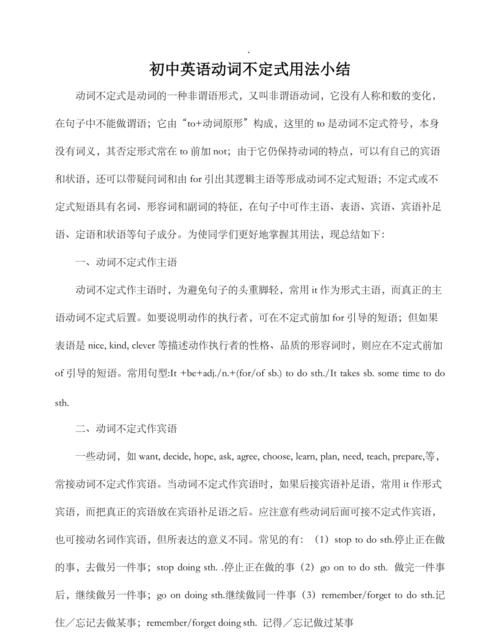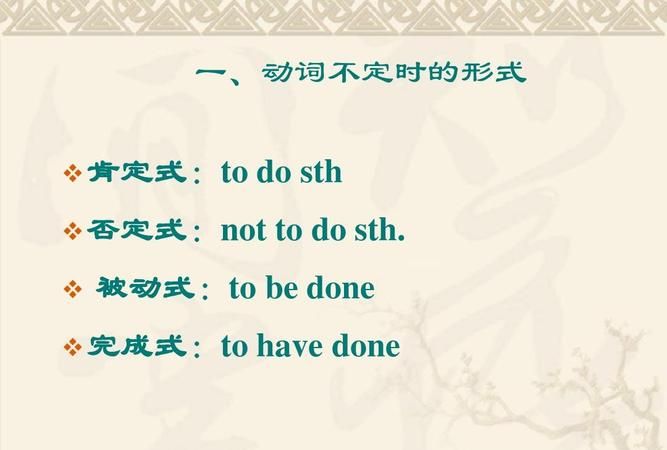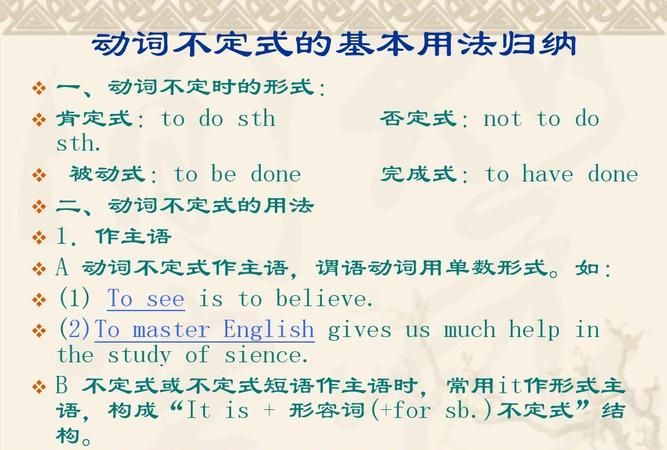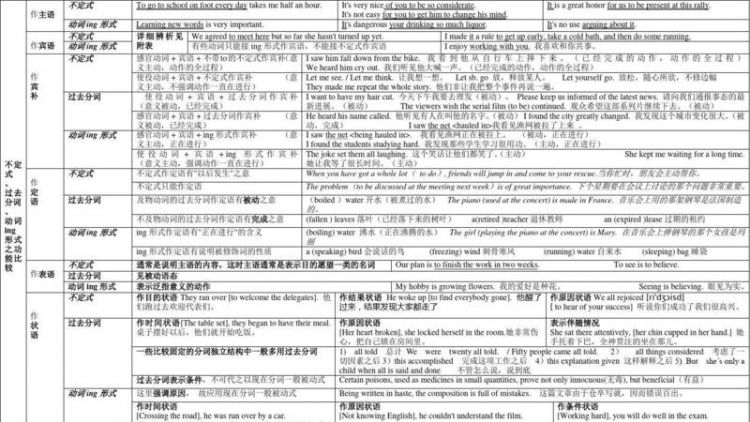本文目录
英文中to有时用于不定式
建议查一下
牛津高阶
字典
中to这个词条,平时要多记
笔记
,多积累。
to有两种基本
用法
一、置于
动词原形
之前,构成不定式.
动词不定式的几种用法:
1.用作许多动词的宾语
eg:He
wants
to
go.他想去.
She
asked
me
to
go.他要求我去.
2.在
状语
成分中表示目的或结果
eg:They
came
in
order
to
help
me.他们来是为了帮助我。(表示目的)
She
ran
to
the
station
only
to
find
that
the
train
had
left.她跑到火
车站,但火车却开走了。(表结果)
3.单独使用,以避免重复整个动词不定式
eg:I'd
like
to
do
it
but
I
don'tknow
how
to.我倒是愿意做,但不知怎么做。
二、用作
介词
1.向,朝,对着(某方向或某处)walk
to
the
office
to
the
north
位于北方
2.趋于,倾向(某种情况、状态、性质等)a
move
to
the
left
转向左
tear
the
letter
to
pieces
把信撕碎
3.(1)到某处
extend
to...
伸展至...
reach
down
to...垂至...
(2)知道并包括(某事物)............

初中英语重点知识归纳笔记
中学英语知识
1、现在进行时
表示正在发生的事情或进行的动作,常与now,listen,look等词连用,结构是主语+be动词(am, is, are)+动词ing.
如:It is raining now.
外面正在下雨
It is six o’clock now.
现在6点了
My parents are reading newspapers in the sitting room.
我父母正在客厅看报纸
Look! The children are having a running race now.
看!孩子们正在赛跑
问句将be动词移前,否定句在be动词后+not.
2、一般现在时
表示经常反复发生的事情或动作,常与often, usually, sometimes, always, every day(week year…) on Sundays等词连用。
结构是主语+动词原形;当主语为第三人称单数即he,she, it, Tom, my mother, the boy等词时,动词后加s或es.
如:We have an English lesson every day.
我们每天都要上英语课
Do the boys run faster than the girls? Yes, they do.
男孩比女孩跑的快吗?是的
问句借助于do, does否定句借助于don’t, doesn’t,后面动词一定要还原。
3、一般过去时
表示发生在过去的事情或存在的状态,常与just now; a moment ago; … ago; yesterday; last ( week; month; year; Monday; weekend); this morning等词连用。
结构是主语+be动词的过去式(was; were)或主语+动词的过去式。
注意:be动词与动词过去式不可同时使用。
如:My earphones were on the ground just now.
我的耳机刚刚还在呢。
Where were you last week? I was at a camp.
你上个星期去哪了?我去野营了
What did you do yesterday? I visited a farm
你昨天去干嘛了?我去参观农场了。
问句有be动词将be动词移前,没有be动词借助于did,后面动词还原;
否定句有be动词在后面加not,没有借助于didn't后面动词还原。
中学英语知识重点
一、情态动词
can; can’t; should; shouldn’t; must; may后一定加动词原形。
如:The girl can’t swim, but she can skate.
女孩不会游泳,但是会滑冰
Don’t talk in class, you should listen to the teacher carefully.
不要再课上说话,你应该认真听老师讲。
二、祈使句
肯定祈使句以动词原形开头;否定祈使句以don’t加动词原形开头。
如:Open the box for me ,please.
请为我打开盒子。
Liu Tao! Please get up earlier tomorrow.
刘涛,明天请早点起床!
Don’t walk on the grass!
不要在草地上走!
Helen! Don’t climb the tree,please.
海伦!不要爬树。
三、go的用法
去干嘛用go +动词ing
如: go swimming; go fishing;
go skating;
go camping;
go running;
go skiing;
go rowing…
四、比较
than 前用比较级;as…as之间用原级。
如:My mother is two years younger than my father.
我妈比我爸年轻两岁。
Liu Tao jumps as far as Ben.
刘涛跳得和本一样远。
中学英语必背知识
1、must
(1)must 表示主观看法,意为“必须”。
如:
You must stay here until I come back。
Must I hand in my homework right now?
对must引导的疑问句,肯定回答为must,否定回答为needn’t 或don’t have to 。
如:
—Must I finish my homework?
—No, you needn’t。
(2)must也可以表示有把握的推测,意为“ 一定,肯定”,用于肯定句。
如:
The light is on, so he must be at home now。
其否定形式mustn’t表示“禁止,不许”。
如:
You mustn’t play with fire。
You mustn’t be late。
2、could
(1)can的过去式,意为“能、会”,表示过去的能力。
如:
He could write poems when he was 10。
(2)could在疑问句中,表示委婉请求的语气,此时could没有过去式的意思。
如:
Could you do me a favour?
—Could I use your pen?
3、might
might为may的过去式。might表示推测时,表示可能性低于may(此时might没有过去式的意思),当请求讲时,比may的语气更委婉。
He is away from school。 He might be sick。
Might I use your dictionary?
4、can
(1)表示能力,一般译为“能、会”,尤其指生来具备的能力。
如:She can swim fast, but I can’t 。
(2)表示许可,常在口语中。
如:You can use my dictionary。
(3)表示推测,意为“可能”,常用于否定句和疑问句中,此时can’t译为“不可能”。
如: —Can the news be true?
—No, it can’t be our teacher。 He is on a visit to the Great Wall。
初中英语重点知识
1、 时间状语从句
(1)时间状语从句常用when, as, while, before, after, since, till, until, as soon as等连词来引导。例如:
It was raining hard when got to school yesterday.
While he was doing his homework, the telephone rang.
As he walked along the lake, he sang happily.
He had learned a little Chinese before he came to China.
After he finished middle school, he went to work in a factory.
(2)在时间状语从句里,通常不用将来时态,用现在时态表示将来的动作或状态。例如:
I’ll ring you up as soon as I get to New York.
I will tell him everything when he comes back.
He won’t believe it until he sees it with his own eyes.
(3)在带有till或until引导的时间状语从句的主从复合句里,如果主句用肯定式,其含义是“一直到……时”,谓语动词只能用延续性动词。如果主句用否定式,其含义是“直到……才……”, “在……以前不……”, 谓语动词可用瞬间动词。例如:
The young man read till the light went out.
Let’s wait until the rain stops.
We won’t start until Bob comes.
Don’t get off until the bus stops.
2 、条件状语从句
(1)条件状语从句通常由if, unless引导。例如:
What shall we do if it snows tomorrow?
Don’t leave the building unless I tell you to.
(2)在条件状语从句里,谓语动词通常用现在时态表示将来的动作或状态。例如:
I’ll help you with your English if am free tomorrow.
He won’t be late unless he is ill.
(3)“祈使句 + and (or)+ 陈述句” 在意思上相当于一个带有条件状语从句的复合句。例如:
Hurry up, or you’ll be late.
=If you don’t hurry up, you’ll be late.
Study hard and you will pass the exam.
=If you study hard, you will pass the exam.
初中必备的英语知识
一、come 短语
1. come across (偶然)遇见(或发现)
2. come along (意外地)出现;发生;来到
3. come from 来自
4. come into 进入
5. come in 进来
6. come out 出版;发表
7. come on 快点儿
8. come over 顺便来访
9. come true (希望等)实现
二、get 短语
1. get away 逃离;走开
2. get back 返回;回来;回家
3. get close(to) 接近
4. get down 降下
5. get down to 开始认真(做某事)
6. get in 进入;收获;达到
7. get off 下车
8. get on 上车
9. get through 通过;拨通(电话)
10. get gogether 聚会;联欢
11. get up 起床
三、give 短语
1. give up 放弃
2. give in 屈服;让步
3. give away 赠送;分发
4. give out 分发;发放
5. give back 还给;归还;恢复(健康等)
6. give birth to 生;产生
7. give…a lift 捎(某人)一程
初中英语知识口诀
一、 动词不定式不带to的动词
五看(notice,observe,see,look at,watch),
三使役(have,let,make),
二听(hear,listen to),
一感觉(feel)。
按:在上述动词后做宾语补语用的不定式不带to。
二、非谓语动词
动词不做谓语用,
不定、分词与动名。
to 加原形不定式,
词组可做名、副、形。
分词现在和过去,
相当副词和形容。
原形加上“ing”,
动词具有名词性。
三、基数词变序数词(之一)
基变序,有规律,
词尾字母 tdd 。①
八减 t,九减 e,
f 要把 ve 替。②
ty 把 y 变成 i ,
记住th前有个e。③
① 指first、second、third。
② 指eight去掉t,nine去掉e,five和twelve去掉ve加上f。
③ 指twenty→twentieth等。
四、基数词变序数词(之二)
第一、二、三要全变,①
其余“th”加后边,②
“th”里有例外,
你需格外记明白:
八减 t,九减 e,③
字母 f 代ve,④
ty 变 tie。⑤
① one-first,two-second,three-third。
② four-fourth,seven-seventh,hundred-hundredth。。
③ eight-eighth ,nine-ninth。
④ five-fifth,twelve-twelfth。

人教版初三英语上册知识点总结
2021初三英语上册知识点 总结 有哪些你知道吗?英语课是一门实践能力课,应该在培养初步运用英语的能力上下功夫,关注孩子们 学习英语 的兴趣、态度、自信心等问题。一起来看看2021初三英语上册知识点总结,欢迎查阅!
初三英语上册知识点总结
动词不定式
一. 定义:
由to+动词原形构成。不定式是一种非限定性动词。而非限定动词是指那些在句中不能单独充当谓语的动词,可分为不定式,动名词,现在分词和过去分词。“动词不定式”由动词+不定式构成。动词不定式在句中可以作 句子 除谓语之外的任何句子成分。动词不定式的被动形式除了一般形式外还有其完成式和进行式。
二. 动词不定式的构成:to+动词原形
(1)作主语
动词不定式作主语时,句子的谓语动词常用单数,其位置有以下两种: (1)把不定式置于句首。
如:To get there by bike will take us half an hour.
(2)用it作形式主语,把真正的主语不定式置于句后,常用于下列句式中。
如:
It+be+名词+to do It's our duty to take good care of the old.
It takes sb+some time+to do How long did it take you to finish the work?
It+be+形容词+for sb+to do It is difficult for us to finish writing the composition in a quarter of an hour.
It+be+形容词+of sb+to do It is stupid of you to write down everything (that) the teacher says.
It seems(appears)+形容词+to do It seemed impossible to save money.
在句型中,常用表示客观情况的形容词,如:difficult,easy,hard,important,impossible,necessary 等;
在句型中,常用careless,clever,good,foolish,honest,kind,lazy,nice,right,silly,stupid,wise等 表示赞扬或批评的词。
在不定式前的sb,可看作其逻辑主语。这一句式有时相当于Sb is+形容词+to do句式 ,如:It's kind of you to help me with my English.=You are kind to helpme with my English.
(3)举例
(1) It's easy (for me) to do that.我做这事太容易了
easy, difficult, hard, important, possible, impossible, comfortable, necessary, better;
the first, the next, the last, the best, too much, too little, not enough
1、It's so nice to hear your voice.
听到你的声音真高兴。
2、It's necessary for you to lock the car when you do not use it.
当你不用车的时候,锁车是有必要的。
(2) It's very kind of him to help us. 他帮助我们,他真好。
Kind, nice, stupid, rude, clever, foolish, thoughtful, thoughtless, brave, considerate(考虑周到的), silly, selfish(自私的)
例句:
1、It was silly of us to believe him. 我们真愚蠢,竟然相信了他。
2、It seemed selfish of him not to give them anything. 他不给他们任何东西,这显得太自私了。
注意:
(1) 其他系动词如,look,appear等也可用于此句型
(2) 不定式作为句子成分时,动词用单数形式。
(3) 当不定式作主语的句子中又有一个不定式作表语时,不能用It is… to…的句型
(对)To see is to believe. 眼见为实。
(错)It is to believe to see.
三. 动词不定式作宾语
后面能接不定式作宾语的动词有:agree, ask, choose, decide, forget, hope, learn, want, wish, would like等。
1、We hope to get there before dark. 我们希望天黑以前到那儿。
2、The man decided to do it herself. 那个男人决定自己做那件事。
动词不定式作宾语的注意事项(2点)
1. 有些动词既可跟不定式作宾语,也可跟动名词作宾语,但含义不同:
remember to do 记住要做某事
remember doing 记得曾经做过某事
forget to do忘记要做某事
forget doing 忘记曾经做过某事
stop to do 停下来去做某事
stop doing 停止做某事
go on to do 继续做另一件事
go on doing 继续做原来在做的事
2. 不定式作宾语时,如带有宾语补足语,则要把不定式放到后面,用it作形式宾语,构成“主语+动词+it+宾补(形容词、名词)+不定式”结构。
如:He found it very difficult to get to sleep.他发现很难入睡。
初三英语上册知识点
一.动词不定式的构成:to+动词原形。
1.作主语。
动词不定式作主语时,句子的谓语动词常用单数,其位置有以下两种:
(1)把不定式置于句首。
如:To get there by bike will take us half an hour。
(2)用it作形式主语,把真正的主语不定式置于句后,常用于下列句式中。
如:
It+be+名词+to do It's our duty to take good care of the old.
二.动词不定式作宾语。
后面能接不定式作宾语的动词有:agree, ask, choose, decide, forget, hope, learn, want, wish, would like等。
1、We hope to get there before dark.我们希望天黑以前到那儿。
2、The man decided to do it herself.那个男人决定自己做那件事。
三.动词不定式作宾语的注意事项。
1.有些动词既可跟不定式作宾语,也可跟动名词作宾语,但含义不同:
remember to do记住要做某事。
remember doing记得曾经做过某事。
forget to do忘记要做某事。
2.不定式作宾语时,如带有宾语补足语,则要把不定式放到后面,用it作形式宾语,构成“主语+动词+it+宾补(形容词、名词)+不定式”结构。
四.动词不定式作宾语补足语。
1.后面能接to不定式作宾语补足语的动词有:ask, order, teach, tell, want, wish, help等。
I want both of you to go. 我要你们俩去。
We helped her (to) repair her bike. 我们帮助她 修理 自行车。
2.使役动词let, have, make及感官动词see, watch, notice, hear, feel等要以不带to的不定式作宾补。
Let’s have a rest.我们休息一会吧。
I saw him come in.我看见他进来了。
感官动词后既可跟不带to的不定式作宾补,也可跟v-ing作宾补,前者表示动作的全部过程已结束;后者表示动作正在进行。
I saw him come downstairs.我看见他下了楼。(说明他下楼了这件事)
I saw him coming downstairs.我看见他在下楼。(说明他下楼时的情景)
怎么提高英语成绩
背单词
单词的积累在英语的学习中是最基础也是非常重要的一步。但是不少同学经常会出现背看就忘的情况,这里李老师教大家一个 方法 :
结合一下读音来背,边读这个单词,边用手指划一下怎么写。除此之外还要注意,记单词不要只会看着中文背英文,也要反过来看着英文说中文,最好边背边写。
背课本
背书虽然是一件非常枯燥的事情,但是对于提升英语成绩却是实打实的有用,所以同学们一定要坚持住,慢慢的你就会看到质的变化。
学会听
提高听力最关键的地方并不在于你听了多少东西,而是在选择听力材料时要考虑自己的词汇量水平。
另外,要学会精听和泛听。精听指能够听出原文中的所有细节(特别是数字),包括时态,单复数,第三人称等。泛听指能够在听力材料中汲取重现巩固知识点,培养耳朵对英文的敏感度,获取新的知识。
大胆说
学习英语最忌讳的就是闭口不言,在心里默念跟讲出来真的很不一样。
同学们平时可以尝试反复高声朗读课文,这种做法的目的是培养自己的语感,只有具备了语感,才能在做习题时不假思索、下意识地写出正确答案。
记笔记
初中的知识点不多,平时上课的时候就养成做笔记的习惯,如果课上做的笔记太乱,可以课后再用 笔记本 整理一下,整理下来你会发现很多知识点老师都在重复地讲,最后发现就那么些知识点要掌握。
提兴趣
培养学习英语的兴趣可以从美剧入手,一开始先尝试简单易懂的剧,不要第一次就挑谍战片、科幻片,大量生词的那种,很影响剧情理解。
2021初三英语上册知识点总结相关 文章 :
★ 九年级英语知识点归纳2021
★ 九年级英语知识点总结2021
★ 九年级上册英语知识点
★ 2021初中英语工作总结
★ 七年级英语上册知识点2021最新
★ 七年级英语下册知识点归纳2021
★ 初中生的学习技巧
★ 小初高英语学习方法大全
★ 2021中考英语作文高分的要点有哪些
★ 2021中考英语作文高分的要点有哪些(2)

简单介绍一下自己
动词 + to do sth(doing sth)
A. remember/forget to do sth.记住/忘记未做之事;remember/ forget doing sth.记住/忘记已做之事。如:
(1)I’ll remember/ won’t forget to turn off the computer when I leave. I don’t think you need to worry.
离开时我会记着(不会忘记)关电脑的。你不必担心。
(2)Do you remember/Haven’t you forgotten our meeting each other at the station five years ago?
你还记得(还没忘记)5年前我们曾在车站见过面吧?
B. regret to do sth.(对即将做或未做之事表示)道歉、遗憾;regret doing sth.(对已做之事感到)后悔、遗憾。如:
(1)I’m always regretting selling my favourite Chinese-English dictionary.
我因为把我那本心爱的汉语词典给卖了,老是感到后悔。
(2)We regret (are sorry) not to tell you the truth at the very moment.
不好意思,当时没把真实情况告诉你。
C. stop to do sth.停下来(停下手中之活)做(去做另外的事),不定式短语用做状语,表示目的;stop doing sth.停止做……(停下来手中正为之事),动名词短语用做宾语。如:
(1)Will you please stop to help us? We are in great need of help.
请停下来帮帮我们,好吗?我们很需要人帮忙。
(2)Will you please stop making so much noise? Nobody can hear what the lecturer is speaking about too clearly.
请别吵闹太厉害,都没人能听清楚演讲者的话。
D. go on to do sth.(搁下手中之活)继续做(另外之事);go on doing sth.继续做(手中之活)。如:
(1)Let’s have a little rest and then go on doing what we’re dealing with now.我们稍息片刻,然后接着做我们现在所为之事。
(2)The teacher asked the students to stop reading aloud and then told them to go on to make notes of what he was saying.
老师叫学生别再朗读了,然后又接着叫他们做笔记。
E. mean to do sth.想要做某事,意欲做某事;mean doing sth.意思是,意味着。如:
(1)I didn’t mean to get you into trouble, but ...
I’m really sorry.
我本不想让你难堪的,但……实在抱歉。
(2)Revolution means liberating productive force.
革命就是解放生产力。
F. can’t help to do sth.无助于做某事;can’t help doing sth.情不自禁做某事。如:
(1)We can’t help to do this for you, so we must say sorry.
我们无能为力帮你们办此事,在此我们感到歉疚。
(2)The audience couldn’t help cheering when they saw the little girl’s wonderful performing.
观众们看到那小女孩精彩的表演都情不自禁高声喝彩。
G. try to do sth.努力,(想方设法,尽力)做某事;try doing sth.试着,尝试做某事。如:
(1)He tried hard to give up smoking, but failed.
他想戒烟,但没做到。
(2)After we had begun to learn English for some time, we tried speaking English in English class.
我们学了一阵子英语之后,就试着上英语课时讲英语。
H. like/prefer/dislike/hate to do sth.(某时具体的)喜欢/不喜欢/讨厌做某事;like/prefer/dislike/hate doing sth.(一般倾向性或习惯性的)喜欢/不喜欢/讨厌做某事。如:
(1)She liked/ preferred to play tennis when she studied at middle school.
她在中学读书时喜欢打乒乓球。
(2)I disliked/ hated to be spoken like that when I was young.
我小的时候讨厌别人对我那样讲话。
I. want/ need /require to do sth.想要/需要做某事;want/need/require doing(只能接及物动词)=want/need
/require to be done需要……(动名词主动形式表示被动意义)如:
(1)Her daughter wants to go to Qinghua University.
她女儿想读清华大学。
(2)I think our teacher needs/requires to explain the difficult questions to us once again.
我想我们的老师需要把那些难题再给我们解释一下。
(3)The question wants/needs/requires explaining again.=The question wants/needs/requires to be explained again.
那个问题需要再次解释。
J. begin/start/cease to do sth.开始/停止做某事(指一般情况);而(表示有意识地)开始/停止做某事,则begin/start/cease doing sth.如:
(1)We began/started to work at once.
我们立即开始工作。
(2)They began/started working on the project about three months ago.
大约3个月前他们就着手那项工程了。
K. see/hear/watch/notice /feel+宾语+do sth.看见/听见/观看/发现/感觉……做了某事(强调宾补语动作发生的过程和结果),其被动结构为:be seen/heard/watched/noticed/felt to do sth; see/hear/
watch/notice/feel+宾语+doing sth.看见/听/观看/发现/感觉到……正在做某事(强调宾补语动作的进行),其被动结构为:be seen/heard/watched/noticed/
felt doing;see/hear/watch/notice/feel+宾语+done(只能是及物动词):看见/听见/观看/发现/感觉到……被……(宾语是宾补语动作的承受者),同样也有被动结构形式。如:
(1)On arriving at the theatre, we noticed them singing the popular song.
一到剧场,我们就发现他们正在唱那首流行歌曲。
Arriving at the theatre, we noticed them sing quite a few popular songs.
到剧场,我们发现他们唱了好几首流行歌曲。
Arriving at the theatre, we noticed several popular songs sung.
我们一到剧场就发现已经唱了好几首流行歌曲。
(2)The teacher watched the students making the experiment.
老师观看学生们做实验。
The teacher watched the students try the experiment.
老师看了那些学生做实验。
The teacher watched the experiment done.
老师观看了做实验。
(3)I felt someone pat me on the shoulder.
我感觉到刚才有人拍了我的肩膀。
I felt someone patting my shoulder.
我感觉到刚才有人在拍我的肩膀。
I felt my shoulder patted.
我感觉我的肩膀被拍了一下。
(4)Passing his house, we heard Father scolding his daughter.
从他家经过的时候,我们听到父亲在责怪女儿。
We heard Father scold his daughter.
我们听见父亲责怪了他的女儿。
When we passed his house, we heard his daughter scolded.
从他家经过时,我们听见他女儿挨骂。
L. have+宾语+do sth=get+宾语+to do sth.让(使)某人做某事;have+宾语+doing sth.让/使(一直做)=get+宾语+doing sth.(进入某种状态);have+宾语+dOne=get+宾语+done让(别人)做某事。如:
(1)How large manpower do you think we will get to/have help with the summer harvest?
你认为我们将找多少人来帮我们夏收?
(2)I won’t have anyone cheat me.=I won’t get anyone to cheat me.
我不会让任何人骗我的。
(3)She’ll have you doing all the housework if you are not careful.
如果你不小心的话,她会要你把所有的家务活都干了。
(4)The lecturer soon got all of us thinking.
演讲者马上就使得我们所有的人都思考了。
(5)My hair is too long. I’ll have to have/get it cut.
我的头发太长了。我得找人理理。

以上就是关于英语动词不定式的用法笔记,简单介绍一下动词不定式的全部内容,以及英语动词不定式的用法笔记 的相关内容,希望能够帮到您。
